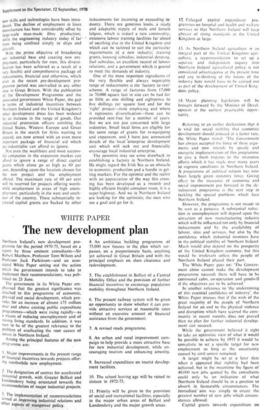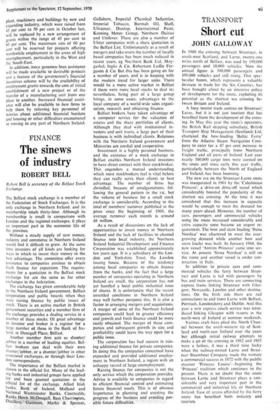WHITE PAPER
The new development plan
Northern Ireland's new development pro- gramme for the period 1970-75, based on a report by three eminent consultants—Sir Robert Matthew, Professor Tom Wilson and Professor Jack Parkinson—and an asso- ciated White Paper setting out the action which the government intends to take to implement their recommendations, was pub- lished on 23 June.
The government in its White Paper em- phasised that the greatest significance was attached to this programme of economic, physical and social development, which pro- vides for an increase of almost £75 million over and above existing public expenditure programmes--which were rising rapidly--as a means of reducing unemployment and of raising living standards. In addition, it was seen to be of the greatest relevance to the problem of eradicating the root causes of unrest in Northern Ireland.
Among the principal features of the new programme are: I. Major improvements in the present range of financial incentives towards projects offer- ing worthwhile new employment.
2. The designation of centres for accelerated industrial growth, with Greater Belfast and Londonderry being orientated towards the accommodation of major industrial projects.
3-The implementation of recommendations aimed at improving industrial relations and other aspects of manpower policy.
4. An ambitious building programme of 73,000 new houses in the plan which sur- passes, on a proportionate basis, anything yet achieved in Great Britain and with the principal emphasis on slum clearance and redevelopment.
5. The establishment in Belfast of a Central Mobility Office and the provision of further financial incentives to encourage population mobility throughout Northern Ireland.
6. The present railway system will be given an opportunity to show whether it can pro- vide attractive services at reasonable rates without an excessive amount of financial assistance from the government.
7. A revised roads programme.
8. An urban and rural improvement cam- paign to help provide a more attractive base for new industrial development, while en- couraging tourism and enhancing amenity.
9. Increased expenditure on tourist develop- ment facilities.
10. The school leaving age will be raised to sixteen in 1972-73.
11. Priority will be given to the provision of social and recreational facilities, especially in the major urban areas of Belfast and Londonderry and the major growth areas.
12. Enlarged capital expenditure pro- grammes on hospital and health and welfare services so that Northern Ireland will keep abreast of rising standards in the United Kingdom at large.
13. As Northern Ireland agriculture is an integral part of the United Kingdom agri- culture, a recommendation to set up a separate and independent inquiry into Northern Ireland agricultural policy is not considered advantageous at the present time and any re-thinking of the future of the industry here would have to he carried out as part of the development of United King- dom policy.
14. Major planning legislation will be brought forward by the Minister of Devel- opment at the earliest practicable oppor- tunity.
Referring to an earlier declaration that it is vital for social stability that economic development should proceed at a faster rate, the White Paper stated: 'The Government has always accepted the force of these argu- ments and now intends by speedy and energetic implementation of this programme to give a fresh impetus to the strenuous efforts which it has made over many years to improve conditions in Northern Ireland. A programme of political reform has now been largely given statutory force. Giving effect to the measures of economic and social improvement put forward in the de- velopment programme is the next step in tackling the special problems which face Northern Ireland.
However, the programme is not meant to be seen as a panacea. A substantial reduc- tion in unemployment will depend upon the attraction of new manufacturing industry which will be influenced not only by financial inducements and by the availability of labour, sites and services, but also by the confidence which industrial investors have in the political stability of Northern Ireland. Much would also depend on the prosperity of the United Kingdom economy, but this would be irrelevant unless the people of Northern Ireland played their part.
The White Paper goes on: The Govern- ment alone cannot make the development programme succeed; there will have to be communal calm, co-operation and goodwill if the objectives are to be achieved.'
In another reference to 'the undermining of this essential confidence of industry', the White Paper stresses that if the wish of the great majority of the people of Northern Ireland for an end to the physical violence and disruption which have scarred the com- munity in recent months does not prevail then no plan for further industrial develop- ment can succeed.
While the government believed' it right to take an optimistic view of what it would be possible to achieve by 1975 it would be unrealistic to set a specific target for new employment so long as the uncertainty caused by civil unrest remained.
A target might be set at a• later date when it appeared that stability had been achieved, but in the meantime the figure of 40,000 new jobs quoted by the consultants could only be an indication of what Northern Ireland should be in a position to absorb in favourable circumstances. The immediate—aim was simply to create the greatest number of new jobs which circum- stances allowed.
Capital grants towards expenditure on plant, machinery and buildings by new and expanding industry, which were raised from 45 per cent to 50 per cent in October last, will be replaced by a new arrangement of grants within the range of 45 per cent to 60 per cent. The maximum rate of 60 per cent will be reserved for projects offering worthwhile employment in the areas of high unemployment, particularly in the West and the South-East.
In addition, more generous loan assistance will be made available to desirable projects and a feature of the government's financial incentives scheme will be the availability of employment grants towards the cost of initial establishment of a new project or of the transfer of a manufacturing unit from one place to another. Increased financial assist- ance will also be available to new firms to help them by relieving key personnel of worries about additional financial burdens and housing or other difficulties encountered in moving to any part of Northern Ireland.















































 Previous page
Previous page